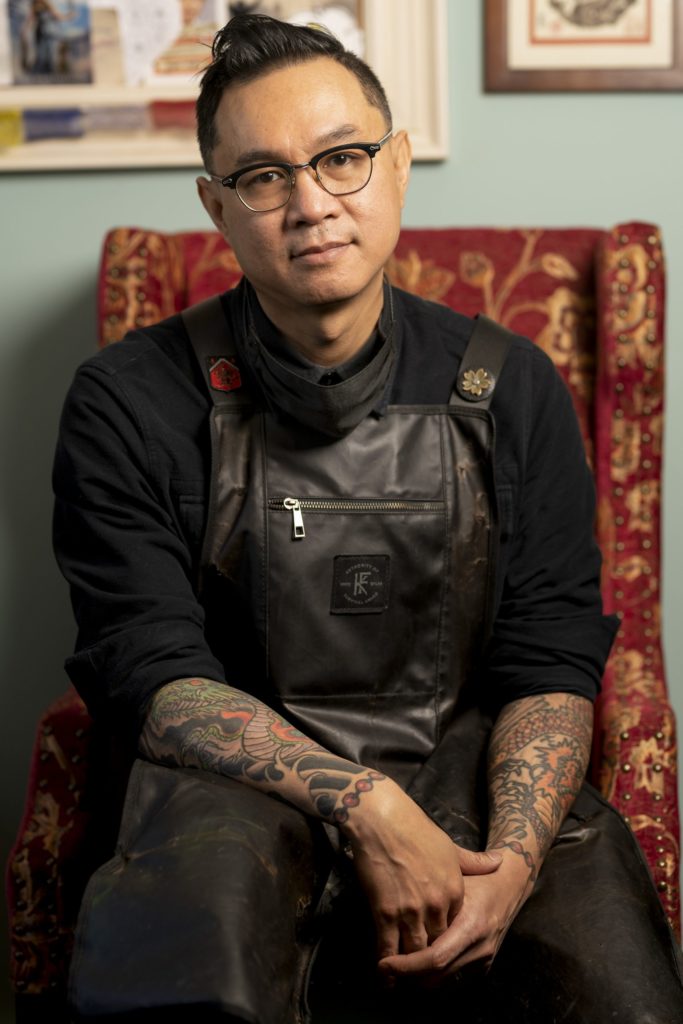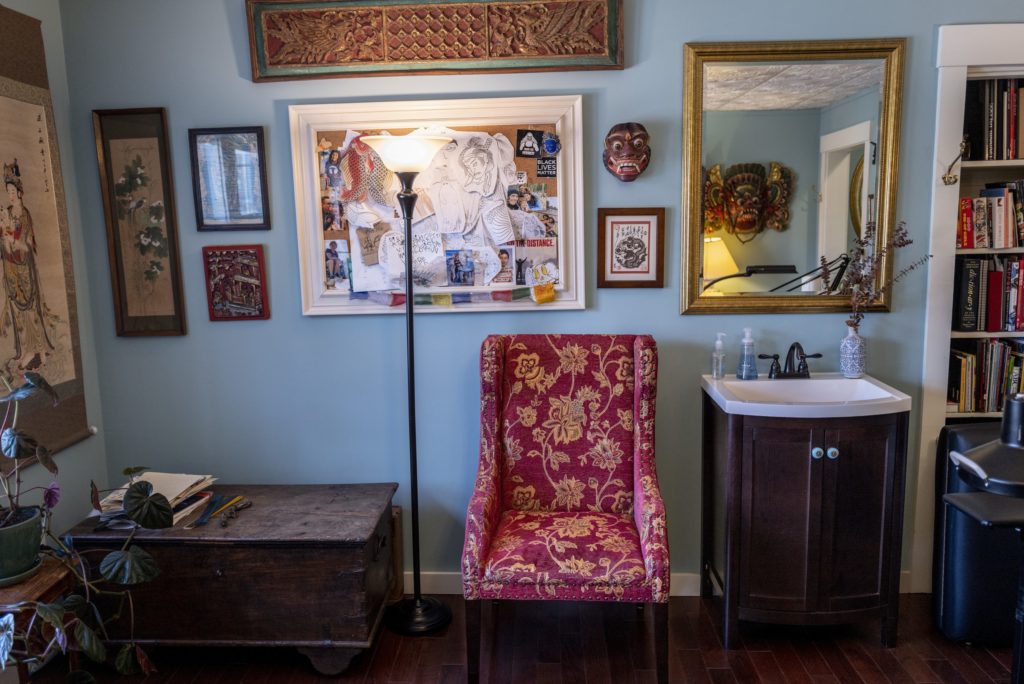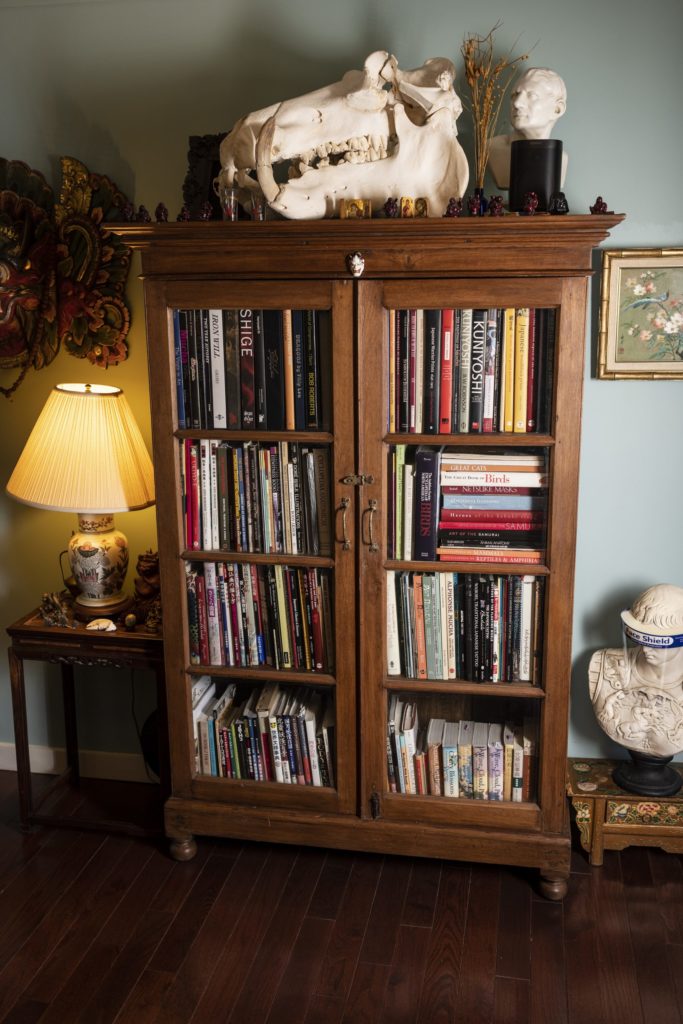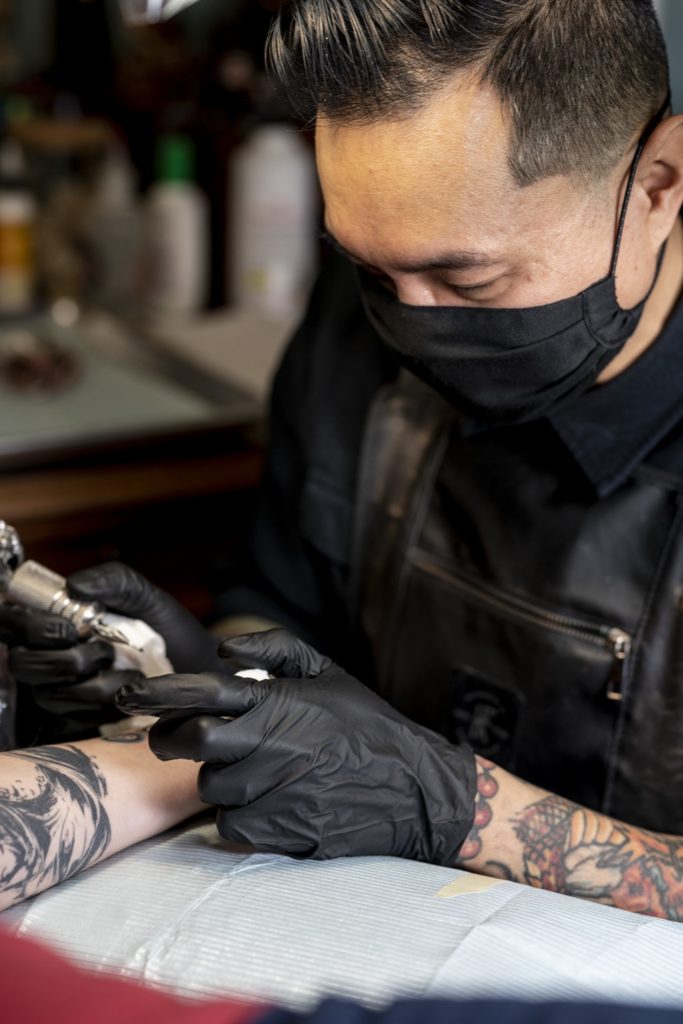Classicist, Tattoo Artist, and Author Phuc Tran Spills the Ink

Classicist, Tattoo Artist, and Author Phuc Tran Spills the Ink
The Portland powerhouse balances his (many) roles.
by Katherine Gaudet
Photography: Séan Alonzo Harris
Issue: May 2021
When I arrive to meet Phuc Tran at Tsunami Tattoo, he’s got a few minutes to go on the cyberpunk cityscape he’s creating on a client’s lower arm, so I settle onto a tufted velour bench in the beautifully decorated waiting room and flip through the tattooers’ portfolios that sit on a vintage coffee table. I haven’t met Tran before, but I have some reason to feel I know him: I’ve spent hours with his younger self, as represented in his widely acclaimed memoir published in 2020. If your social media feed includes bookstores, literary magazines, or bookish people, you’ve probably seen Tran’s face as it was at the age of seven, above the scribbled title Sigh, Gone: A Misfit’s Memoir of Great Books, Punk Rock, and the Fight to Fit In. The book is full of playful language—puns and jokes that spring from the gap between Tran’s family’s native Vietnamese and the American English he grew up with, twisted round with allusions to pop culture, literary classics, skateboarding lingo, and punk rock. It tells the story of the Tran family’s flight from Saigon to become the sole Vietnamese family in a small Pennsylvania town, where the author tries to weave himself a nest of safety and belonging out of cultural artifacts, from Star Wars on.
What got left out of the book, Tran tells me, were the visual arts. “When my high school friends read the memoir, they were like, ‘What about all the art stuff?’ I just didn’t have room. But that was always a vital part of who I was.” Here in the studio, the art is foremost: in the pages of the portfolio, where tigers and dragons and flowers and scrolls twine around biceps and backs, but also in the composition of the room, with elegant teal walls covered in vintage prints and fascinating objects topping antique furniture arranged on restored hardwood floors. It’s a nice place to sit, listening to an indistinct hum of chatter from the tattooers and their clients blending into the early-oughts indie rock playing over the sound system. Tran and his client emerge and complete today’s transaction at a reception desk in the opposite corner of the room, and as the client heads down the stairs to Forest Avenue, I take a seat in Tran’s studio, surrounded by his books and sketches, to find out how he got here.


A hippo skull tops a case of inspirational books, including art classics—Alphonse Mucha, Edward Hopper—as well as comics like Alan Moore’s Swamp Thing and works by Frank Frazetta. 
The tools of the tattooer’s trade: a rainbow of inks sits in front of a row of carved Balinese dancers.
Tran’s memoir closes on his high school graduation, as he heads off to Bard College with a sense of new worlds opening before him. He tells me he chose this framing specifically because it wasn’t about his adult self. “I think there’s an inherent sort of narrative tension in trying to survive, in situations in which you have little agency, right? Like living with your parents. Any damage that happens to me in college and beyond is all self-inflicted, which is less interesting, I think.” Like many a starry-eyed freshman, Tran was a bit let down by Bard, where he started out as an English and art major. He’d been wooed by Bard’s motto “A Place to Think,” but the students there didn’t seem serious, he says: “Half the kids were showing up not having read the book, but happy to pontificate about the book. And in art there were kids trying to do a lot of posturing and, you know, wearing black turtlenecks and smoking French cigarettes. But they could not draw a ham sandwich.” Then, at lunch one day, a fellow student mentioned he was taking ancient Greek. “He said, ‘It’s the hardest thing I’ve ever done.’ And my ears immediately pricked up. Okay, like, challenge accepted. And it was the hardest thing I’d ever done up to that point for sure,” he says. “I went into Greek not wearing glasses—I had perfect vision—and after a semester of Greek I looked up one day and I couldn’t see anything. I practically went blind studying.”

Phuc Tran at work at Tsunami Tattoo, the studio he and his wife, Sue, founded in 2003. While running the tattoo shop and teaching classics at Waynflete Academy, Tran wrote Sigh, Gone: A Misfit’s Memoir of Great Books, Punk Rock, and the Fight to Fit In, one of the most acclaimed books of 2020. 
Tran’s work is known for its exceptional detail and delicacy, as in this monochromatic water goddess.
Tran found his academic home in the classics department (he learned Latin and Sanskrit as well as Greek, and picked up a minor in German), and went on to a master’s program at the University of Massachusetts in preparation for a teaching career. At the same time, he kept taking the bus back to New York to get his tattoos worked on (tattooing was illegal in Massachusetts), and shortly before he graduated, his tattooer mentioned an opening for an apprentice. “No adventure starts with no, right? I’m going to say yes to pretty much anything that crosses my path,” Tran says. He moved back to New York, where he taught Latin during the day and learned tattooing at night. By then he had reconnected with his now-wife, Sue, a Maine native who had been a fellow student at Bard, and in 2003 they moved to Portland to open Tsunami Tattoo in the Old Port. They were also holding down day jobs—Tran taught at Waynflete School, and Sue works in programming for Maine Public Radio— and parenting two young girls. “Many people in Maine wear a lot of different hats,” he notes, and he wasn’t looking to add a new one when he stumbled across another role: writer.



The business cards of Tsunami Tattoo’s four tattooers, with the business’s logo, a cherry blossom—in Japanese tattooing tradition, it’s a symbol for the fleeting beauty of life.
In 2012 Tran gave a TEDxDirigo talk in Lewiston about how English’s subjunctive mood (“if I were to…”) enables a sense of possibility, but also has a “dark side” of focusing attention on what might be rather than what is. The talk is moving, funny, and erudite (and has a truly delightful Star Wars twist), and it attracted the attention of a literary agent, who reached out to Tran to ask if he wanted to write a memoir. “At that point I had thought about doing some writing, but I was teaching during the day and tattooing at night,” Tran recalls, “and I just thought, ‘I’ll just write more when I’m retired and my body is broken.’” But, once again, he couldn’t resist a challenge, and Sigh, Gone was born.
I’d first learned of Tran as a writer, and I ask how it feels to carry that identity now. “I mean, I love writing,” he says. “But—it is so lonely. I think the thing that I really learned about myself from writing is how social I am and how much I enjoy and love the feedback, immediate feedback, from both teaching and tattooing.” He left Waynflete in 2019 (“It was too many irons in the fire,” he says. “I hit the threshold of working two jobs, and writing, and raising a family”), but he intends to return to teaching when it feels sustainable. His tattoo shop is thriving, and if you want to get a tattoo from Tran himself, you’ll have to wait up to a year. While he feels comfortable in his craft, he’s a long way from being bored with it. “I will never grow tired of hearing people’s stories behind their tattoos,” he says. “Those are so incredibly powerful.” As for a next writing project? His agent has been asking, he says, but he’s not in a rush: “I think that I will write again when I have a passion project that is going to propel me through the loneliness.” For now, he’s focusing on what matters most to him—and leaving the future open. “First and foremost is being a good parent to my kids, and a partner to my wife. Those are really on the front burners. But I’m so curious about more writing. I’m not sure what that is. You know, I’m really open to more challenges and adventures. And I’m not afraid to veer out of my lane.”



